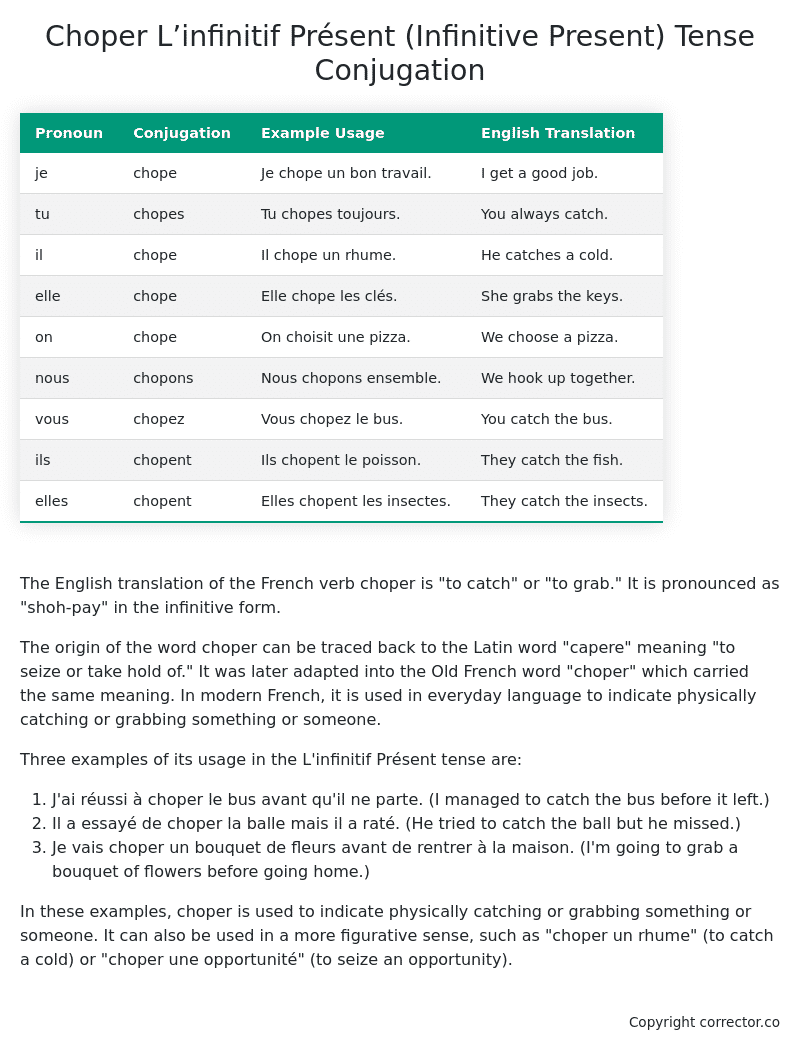L’infinitif Présent (Infinitive Present) Tense Conjugation of the French Verb choper
Introduction to the verb choper
The English translation of the French verb choper is “to catch” or “to grab.” It is pronounced as “shoh-pay” in the infinitive form.
The origin of the word choper can be traced back to the Latin word “capere” meaning “to seize or take hold of.” It was later adapted into the Old French word “choper” which carried the same meaning. In modern French, it is used in everyday language to indicate physically catching or grabbing something or someone.
Three examples of its usage in the L’infinitif Présent tense are:
- J’ai réussi à choper le bus avant qu’il ne parte. (I managed to catch the bus before it left.)
- Il a essayé de choper la balle mais il a raté. (He tried to catch the ball but he missed.)
- Je vais choper un bouquet de fleurs avant de rentrer à la maison. (I’m going to grab a bouquet of flowers before going home.)
In these examples, choper is used to indicate physically catching or grabbing something or someone. It can also be used in a more figurative sense, such as “choper un rhume” (to catch a cold) or “choper une opportunité” (to seize an opportunity).
Table of the L’infinitif Présent (Infinitive Present) Tense Conjugation of choper
| Pronoun | Conjugation | Example Usage | English Translation |
|---|---|---|---|
| je | chope | Je chope un bon travail. | I get a good job. |
| tu | chopes | Tu chopes toujours. | You always catch. |
| il | chope | Il chope un rhume. | He catches a cold. |
| elle | chope | Elle chope les clés. | She grabs the keys. |
| on | chope | On choisit une pizza. | We choose a pizza. |
| nous | chopons | Nous chopons ensemble. | We hook up together. |
| vous | chopez | Vous chopez le bus. | You catch the bus. |
| ils | chopent | Ils chopent le poisson. | They catch the fish. |
| elles | chopent | Elles chopent les insectes. | They catch the insects. |
Other Conjugations for Choper.
Le Present (Present Tense) Conjugation of the French Verb choper
Imparfait (Imperfect) Tense Conjugation of the French Verb choper
Passé Simple (Simple Past) Tense Conjugation of the French Verb choper
Passé Composé (Present Perfect) Tense Conjugation of the French Verb choper
Futur Simple (Simple Future) Tense Conjugation of the French Verb choper
Futur Proche (Near Future) Tense Conjugation of the French Verb choper
Plus-que-parfait (Pluperfect) Tense Conjugation of the French Verb choper
Passé Antérieur (Past Anterior) Tense Conjugation of the French Verb choper
Futur Antérieur (Future Anterior) Tense Conjugation of the French Verb choper
Subjonctif Présent (Subjunctive Present) Tense Conjugation of the French Verb choper
Subjonctif Passé (Subjunctive Past) Tense Conjugation of the French Verb choper
Subjonctif Imparfait (Subjunctive Imperfect) Tense Conjugation of the French Verb choper
Subjonctif Plus-que-parfait (Subjunctive Pluperfect) Tense Conjugation of the French Verb choper
Conditionnel Présent (Conditional Present) Tense Conjugation of the French Verb choper
Conditionnel Passé (Conditional Past) Tense Conjugation of the French Verb choper
L’impératif Présent (Imperative Present) Tense Conjugation of the French Verb choper
L’infinitif Présent (Infinitive Present) Tense Conjugation of the French Verb choper (this article)
Struggling with French verbs or the language in general? Why not use our free French Grammar Checker – no registration required!
Get a FREE Download Study Sheet of this Conjugation 🔥
Simply right click the image below, click “save image” and get your free reference for the choper L’infinitif Présent tense conjugation!

Choper – About the French L’infinitif Présent (Infinitive Present) Tense
Forming the Infinitive Present
Common Everyday Usage Patterns
As a Verb’s Dictionary Form
After Modal Verbs
As an Imperative
In Infinitive Clauses
Interactions with Other Tenses
Present Tense
Future Tense
Conditional Tense
Passé Composé
Imperfect Tense
Subjunctive and Conditional Moods
Summary
Want More?
I hope you enjoyed this article on the verb choper. Still in a learning mood? Check out another TOTALLY random French verb conjugation!


